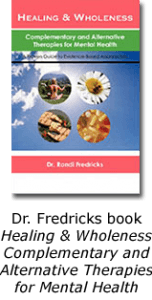
Addiction Treatment
 When treating any type of addiction in addiction counseling, holistic techniques begin with the philosophy that people develop the problem in an attempt to correct an “imbalance” within them.
When treating any type of addiction in addiction counseling, holistic techniques begin with the philosophy that people develop the problem in an attempt to correct an “imbalance” within them.
This imbalance causes them to become stuck, unaware, and unable to deal effectively with thoughts, feelings, and actions.
To correct this imbalance, the addict takes drugs, drinks, or engages in some other form of excessive behavior in order to disassociate. Holistic therapies work to reestablish balance by addressing mind, body, and spirit.
Integrative Addiction Treatment
Because substance abusers often neglect and damage their bodies, nutrition is generally the first line of defense with complimentary and alternative therapies. By creating a sound nutritional base, the immune system is restored and health is stabilized.
As with every health condition, decreasing stress and boosting one’s immunity and psychological resilience can help the body cope better, heal more quickly, and maintain health. The holistic approach encourages the patient to include healing strategies that support the whole person.
There are many healing modalities that offer specific benefits related to withdrawal and relapse prevention. These modes of care can help to reduce tension, anxiety, depression and insomnia, improving overall mental, physical and spiritual well being. They also provide tools that help increase control over one’s behavior in positive ways.
Addiction Treatment for the Whole Person
Of course, for the best chance of success, the healing approaches mentioned below need to be combined with total abstinence, a 12 step program, and other addiction recovery resources, such as psychotherapy.
- EMDR – Eye Movement Desensitization and Reprocessing (EMDR) is a type of psychotherapy which helps people recover from difficult memories, especially traumatic ones. Many people in recovery from addictions have difficult memories in their past; memories that led up to their addiction or memories that resulted from using and drinking. Research indicates that about 60 percent of people in recovery have experienced serious trauma in their lives. In many cases, these old memories lead to repeated relapses.
- Exercise – Exercise provides benefits on many levels and can contribute to the process of addiction recovery. A regular exercise program can boost mood and immunity, increase self-esteem, improve sleep, increase vitality, and promote a deepened awareness of the connection of mind and body.
- Herbal Therapy – Herbs are natural botanical substances that have effects on the body. Many herbs have long been used in detoxification. Among the herbs currently being studied are ginseng for its effect on drug tolerance and dependence, kudzu for its potential to moderate alcohol abuse, kava, and valerian to treat the insomnia that accompanies withdrawal, and milk thistle to improve liver function.
 Hypnotherapy – Hypnotherapy is a state of heightened awareness that creates an openness to learning. This state of focused attention and concentration can be induced by the self or by a therapist. Hypnotherapy can be used as part of a total recovery program by re-enforcing ideas and suggestions compatible with a person’s goals, and can help individuals in recovery to stay focused on abstinence.
Hypnotherapy – Hypnotherapy is a state of heightened awareness that creates an openness to learning. This state of focused attention and concentration can be induced by the self or by a therapist. Hypnotherapy can be used as part of a total recovery program by re-enforcing ideas and suggestions compatible with a person’s goals, and can help individuals in recovery to stay focused on abstinence.- Meditation – There are many different types of meditation which all work to quiet the mind and promote relaxation and mental clarity. In particular, studies have shown Transcendental Meditation’s (TM) effectiveness in reducing the rate of relapse. In addition to reducing tension and anxiety, TM may also enhance a sense of control in anxiety-provoking situations that strengthens the long-term resistance to stress.
- Nutrition – How we eat can have a powerful effect on how we feel and how well our bodies function. Diet and nutritional supplementation can strengthen our immune systems, improve mood, enhance the natural process of detoxification, and restore the body to a healthy balanced functioning level.
- Martial Arts – Qigong and Tai Chi are traditional Chinese health practices, consists of a series of slow moving exercises, breath work, visualizations and meditation. These serve to gather and stimulate the movement of energy (or Qi) in the body. Qigong is believed to have general health promoting and healing effects. It has also been shown to be helpful in addiction by lessening anxiety and promoting more rapid reduction of withdrawal symptoms during detoxification.
- Yoga – The techniques of yoga, which include stretching, diaphragmatic breathing, guided relaxation and meditation, can induce the relaxation response and have other profound restorative effects. Regular practice of yoga can increase flexibility, calm the mind, improve concentration, and promote patience. It can also contribute to a greater sense of control in more acute states when experiencing cravings, insomnia, and agitation.
I am a Registered Addiction Specialist and a Certified Addictions Treatment Counselor with over 30 years helping people and their families with addiction. I also provide psychotherapy and a holistic approach to recovery. Because I have a Doctorate in Naturopathy, I have studied these methods and other natural medicine techniques at the doctoral level. Additionally, I am a Certified Clinical Herbalist, Nutritionist, and Hypnotherapist. My hope is that I can help you to have the solid and happy recovery that you deserve.





